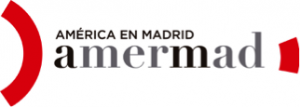 The Presence of America in Madrid: Art, Images and Material Culture in Transit
The Presence of America in Madrid: Art, Images and Material Culture in Transit
International Conference
Organized by: AmerMad Project in collaboration with the Royal Academy of San Fernando, Madrid
Directors: Luisa Elena Alcalá and Benito Navarrete Prieto
Dates: 3-4 (or 10-11) February 2022 (exacts dates to be confirmed)
Place: Real Academia de San Fernando, Madrid
Organized within the context of the research project AmerMad (America in Madrid. Interconnected Patrimony and Touristic Impact in the Comunidad de Madrid: (https://www.amermad.es), this colloquium seeks to analyze the current state of knowledge regarding viceregal art in Madrid.
As is well known, during the Early Modern period, hundreds of objects, artworks, painted and illustrated documents and manuscripts were sent from the Spanish viceroyalties in America to Iberian Spain. This circulation has been the object of renewed academic interest in recent years. In response to this trend, it seems necessary to better understand the particular place that Madrid, as both city (villa) and court (corte), occupied within this broader phenomenon.
The presence of objects with a Spanish American provenance in Madrid has mostly been studied through the lens of the monarchy since the crown was a primary patron, generator, and receiver of all kinds of objects and images, both of documentary and artistic value. Nonetheless, as Madrid grew and developed into a major city in the 17th and 18th centuries, it began to harbor many important institutions which offer other scenarios to explore: great convents, schools, academies, hospitals and churches with their respective religious congregations, all of them places of productive encounters for many people involved and/or connected in some way with life on the other side of the Atlantic.
One of the aims of this colloquium is to refresh and update what we know about the Spanish American patrimony in Madrid between the 16th and the 18th centuries. Another objective is to consider the place that these works should or could occupy in a renewed narrative of the history of art in Spain that is more inclusive, transversal and multicultural.
What stories about Madrid and its art have gone amiss? And, have they remained in the background because of traditional disciplinary divides, such as the one that separates Spanish art (or art in Spain) from Spanish American art? How can we think of Madrid as a crossroads where Iberian and colonial art met? How did objects that came from America interact or engage with local developments of taste, consumption, religious practice, devotion and identity, as well as artistic processes and projects taking place in the capital? What kinds of functions did these works have, and how can we characterize their social impact? In addition, we encourage consideration of how these objects were displayed, if they were more or less visible, and how they have been transformed by changing displays, their meanings becoming more or less relevant for Madrid´s society as times changed.
We invite proposals based on original research that can contribute to advancing the current state of knowledge and explore new questions and theoretical frameworks for our better understanding of these unique objects and works of art.
Please send proposals (400-600 word length) along with a short CV to
elena.alcala@uam.es
benito.navarrete@uah.es
- Due date: September 20, 2021.
- Accepted participants will be notified by October 1st.
- Languages: papers can be in Spanish, English, French, Italian, or Portuguese
Additional information:
This event will coincide with the closing days of the exhibition Tornaviaje. Arte Iberoamericano en España (Museo Nacional del Prado) and the colloquium will include in its planned activities a visit to see it. Other activities are also planned to complement the conference, including a study session of the relevant holdings in the Real Academia de Bellas Artes de San Fernando, which will be coordinated by Juan Bordes and Itziar Arana as head of projects at the RABASF

Leave a Reply
You must be logged in to post a comment.